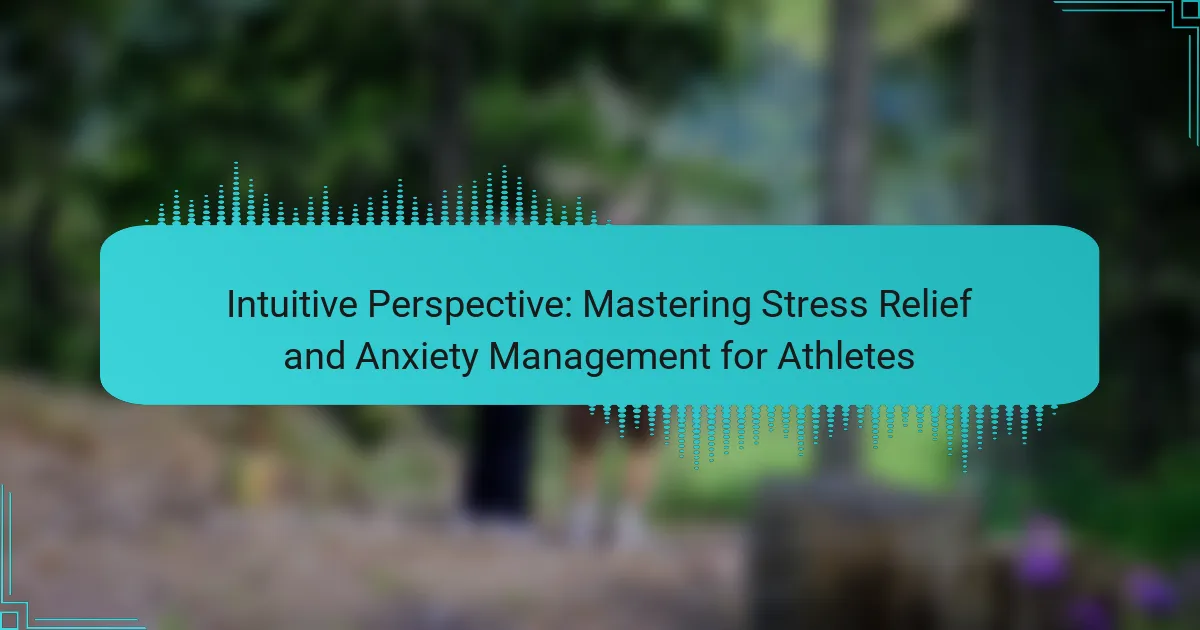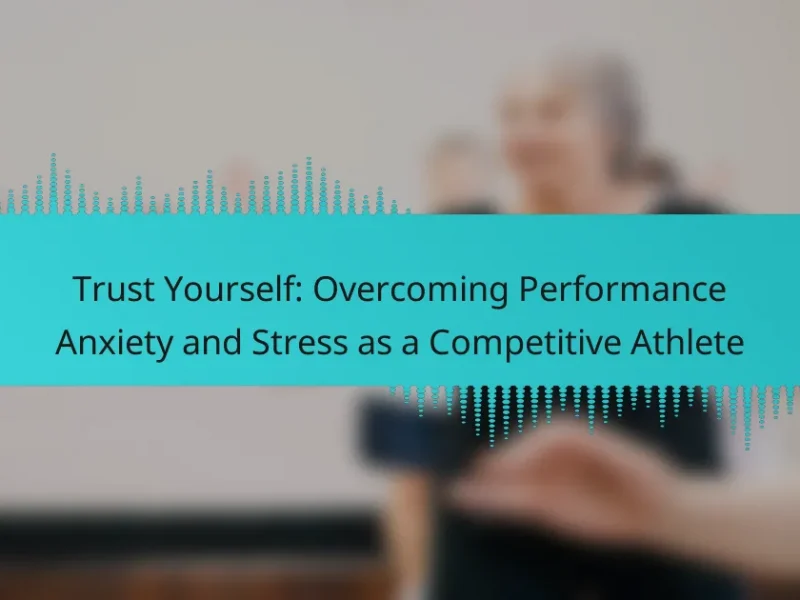Athletes often face significant stress and anxiety that can hinder performance. Effective management techniques include mindfulness practices, structured routines, and open communication. These strategies promote mental clarity, emotional balance, and resilience. Incorporating physical activity and proper nutrition further supports optimal mental health and performance.
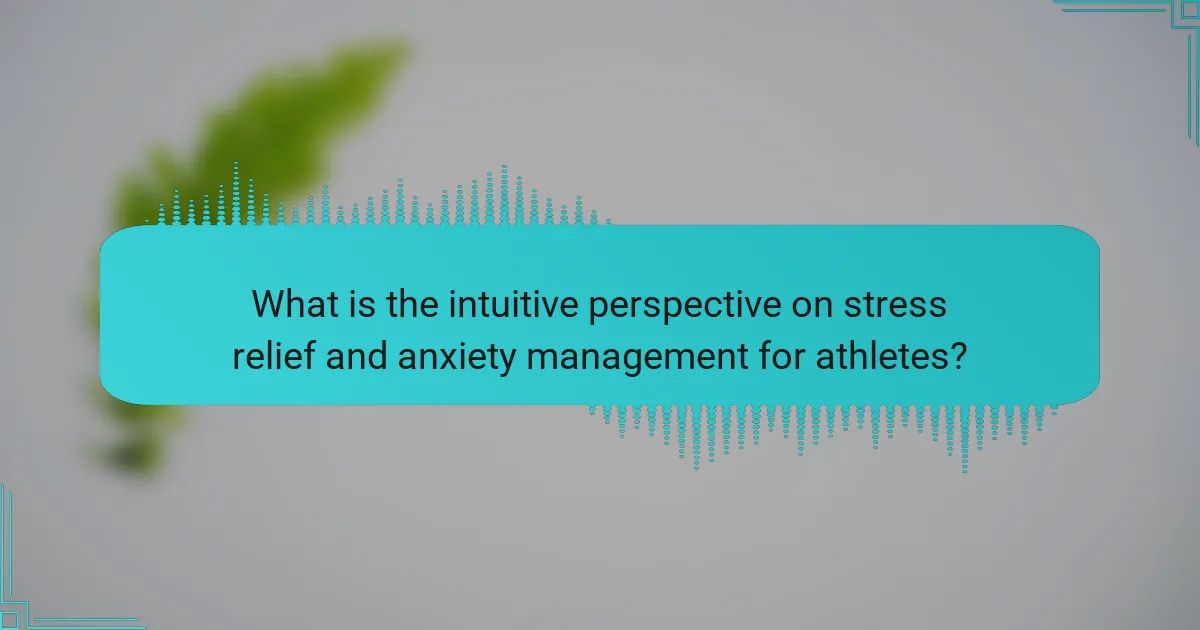
What is the intuitive perspective on stress relief and anxiety management for athletes?
Athletes can effectively manage stress and anxiety through intuitive techniques that promote mental clarity and emotional balance. Mindfulness practices, such as meditation and deep breathing, enhance focus and reduce physiological responses to stress. Visualization techniques help athletes mentally rehearse successful performances, fostering confidence. Establishing a routine that includes physical activity and rest is crucial for maintaining optimal mental health. Engaging in open dialogue about feelings and experiences within a supportive team environment also contributes to emotional resilience.
How does stress impact athletic performance?
Stress negatively impacts athletic performance by impairing focus, increasing fatigue, and reducing physical capabilities. Athletes experiencing high stress levels often face decreased motivation and heightened anxiety, which can lead to suboptimal performance. Studies indicate that stress can elevate heart rate and muscle tension, hindering agility and endurance. Effective stress relief techniques, such as mindfulness and breathing exercises, significantly enhance performance outcomes by promoting mental clarity and physical readiness.
What are common sources of anxiety for athletes?
Common sources of anxiety for athletes include performance pressure, fear of failure, and expectations from coaches and teammates. These factors create a high-stress environment that can hinder performance.
Performance pressure often stems from the desire to win, which can lead to chronic stress. Fear of failure can create a mental block, affecting focus and execution. Expectations from coaches and teammates can amplify anxiety, as athletes strive to meet external benchmarks.
Additionally, injuries and recovery challenges contribute to anxiety. Athletes may worry about their ability to return to form, impacting their mental state. Balancing training, competition, and personal life further complicates their emotional well-being.
Understanding these sources is crucial for developing effective stress relief and anxiety management strategies tailored for athletes.
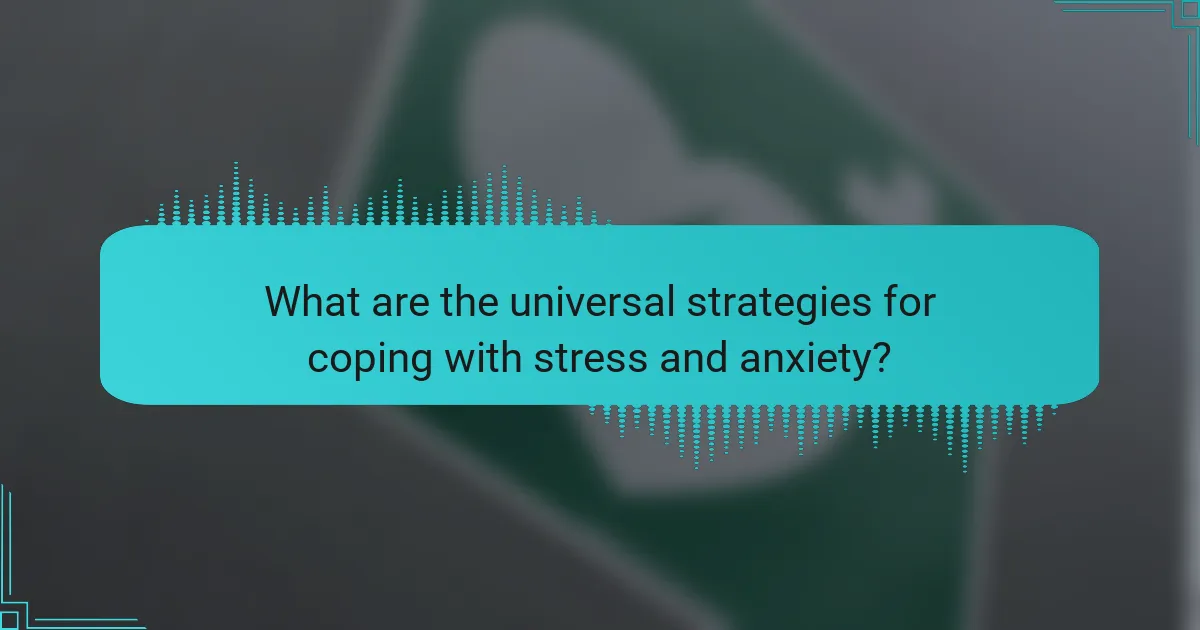
What are the universal strategies for coping with stress and anxiety?
Effective coping strategies for stress and anxiety include mindfulness, physical activity, and structured routines. Mindfulness practices, such as meditation, enhance focus and emotional regulation. Regular physical activity reduces tension and boosts mood through endorphin release. Establishing structured routines provides predictability, which can alleviate anxiety. These strategies are essential for athletes to maintain optimal performance and mental health.
How can breathing techniques help manage anxiety?
Breathing techniques can significantly reduce anxiety by promoting relaxation and enhancing focus. These methods activate the body’s parasympathetic nervous system, which counteracts stress responses. For athletes, mastering these techniques can lead to improved performance under pressure. Studies show that controlled breathing can lower heart rates and decrease cortisol levels, providing a unique advantage in competitive environments. Integrating these practices into training routines fosters mental resilience and emotional regulation, essential for managing anxiety effectively.
What role does physical conditioning play in stress relief?
Physical conditioning significantly enhances stress relief for athletes by promoting physical health and mental resilience. Regular exercise releases endorphins, which alleviate stress and anxiety. Furthermore, structured training routines develop discipline, fostering a sense of control and accomplishment. As a result, athletes experience improved mood and reduced tension, creating a positive feedback loop that supports overall mental well-being.
How does nutrition affect mental well-being for athletes?
Nutrition significantly influences mental well-being for athletes by enhancing mood and reducing stress. A balanced diet rich in nutrients supports cognitive function, which is crucial for performance. For instance, omega-3 fatty acids found in fish improve brain health and emotional stability. Additionally, complex carbohydrates boost serotonin levels, promoting a sense of calm. Hydration also plays a vital role; even mild dehydration can impair focus and increase anxiety. Athletes who prioritize nutrition often report better stress management and resilience during competitions.
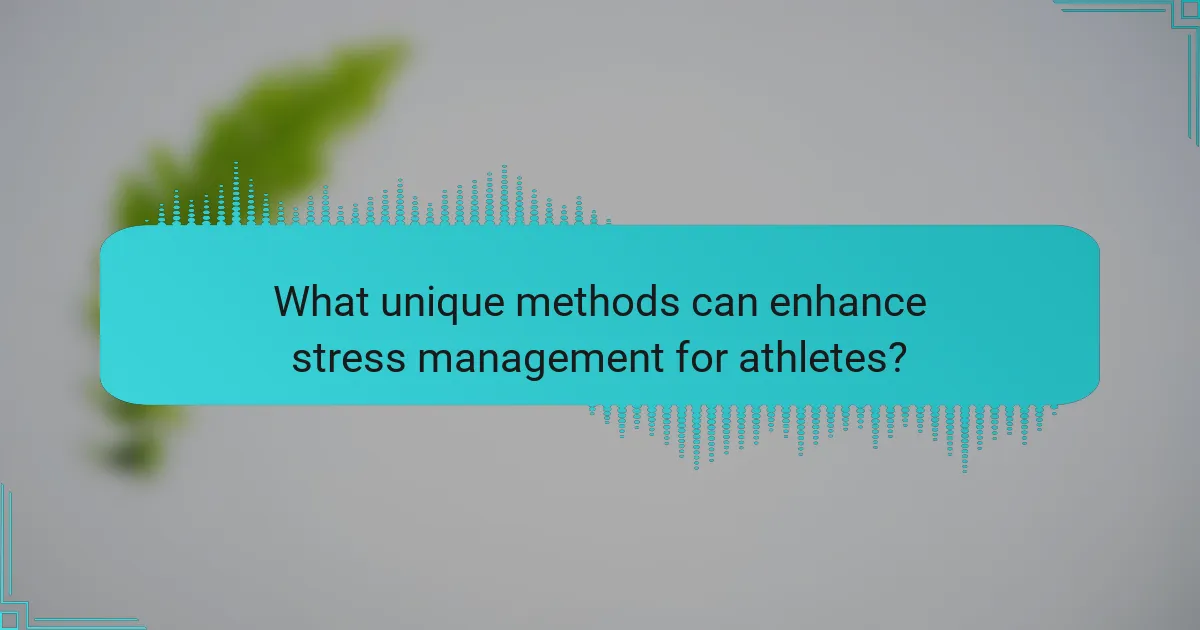
What unique methods can enhance stress management for athletes?
Mindfulness techniques can significantly enhance stress management for athletes. These methods include meditation, breath control, and visualization. Mindfulness fosters present-moment awareness, reducing anxiety and improving focus. Research shows athletes who practice mindfulness report lower stress levels and enhanced performance. Incorporating these techniques into training routines can lead to unique benefits, such as better emotional regulation and resilience under pressure.
How can visualization techniques improve performance and reduce anxiety?
Visualization techniques enhance performance and reduce anxiety by fostering mental clarity and focus. Athletes can mentally rehearse their actions, which improves muscle memory and confidence. Studies indicate that visualization can lower heart rates and cortisol levels, leading to a calmer state. This practice also helps in setting clear goals, reinforcing positive outcomes, and managing stress effectively.
What is the significance of routine in an athlete’s mental health?
Routine significantly enhances an athlete’s mental health by providing structure and stability. It reduces stress and anxiety, allowing athletes to focus on performance. Consistent routines foster discipline, improve time management, and create a sense of control. Research indicates that athletes with established routines experience lower levels of anxiety and improved coping mechanisms during competition. Incorporating mindful practices into routines can further enhance mental clarity and emotional resilience.
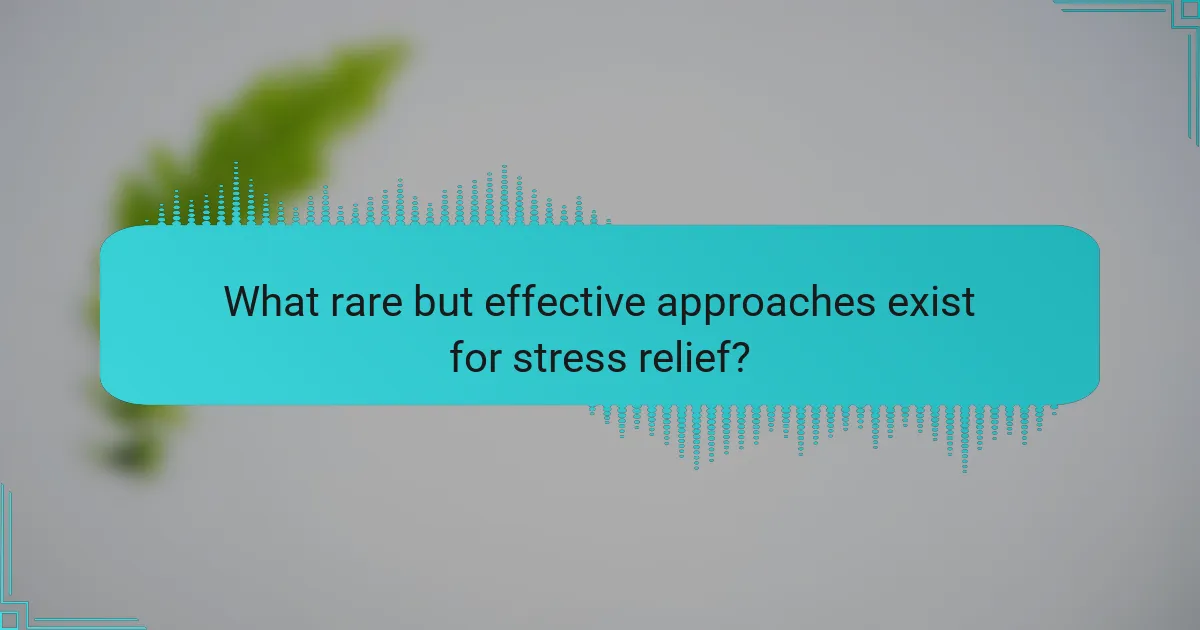
What rare but effective approaches exist for stress relief?
Mindfulness meditation is a rare but effective approach for stress relief in athletes. This practice enhances self-awareness and fosters emotional regulation, leading to reduced anxiety. Research shows that just ten minutes of mindfulness daily can significantly lower stress levels. Another unique method is nature immersion, where spending time outdoors boosts mood and mental clarity. Engaging in creative activities like art or music therapy can also provide a therapeutic outlet for stress, promoting relaxation and focus. Finally, breathwork techniques, such as the Buteyko method, help athletes manage stress responses by regulating breathing patterns.
How can art therapy benefit athletes dealing with stress?
Art therapy can significantly benefit athletes dealing with stress by providing emotional outlets and coping strategies. It fosters self-expression, allowing athletes to process feelings associated with competition and performance pressure. Engaging in creative activities can reduce anxiety and enhance mental clarity, ultimately improving focus and resilience. Studies show that art therapy can lower stress hormone levels, promoting relaxation and overall well-being. This unique approach empowers athletes to manage their emotions effectively, leading to improved performance and mental health.
What unconventional practices have shown promise in anxiety management?
Unconventional practices like breathwork, art therapy, and nature immersion have shown promise in anxiety management for athletes. Breathwork techniques, such as pranayama, enhance focus and reduce tension. Art therapy fosters emotional expression and processing, aiding in mental clarity. Nature immersion, or spending time outdoors, significantly lowers stress levels and promotes overall well-being. These methods offer unique attributes that can complement traditional approaches, enhancing athletes’ performance and mental resilience.
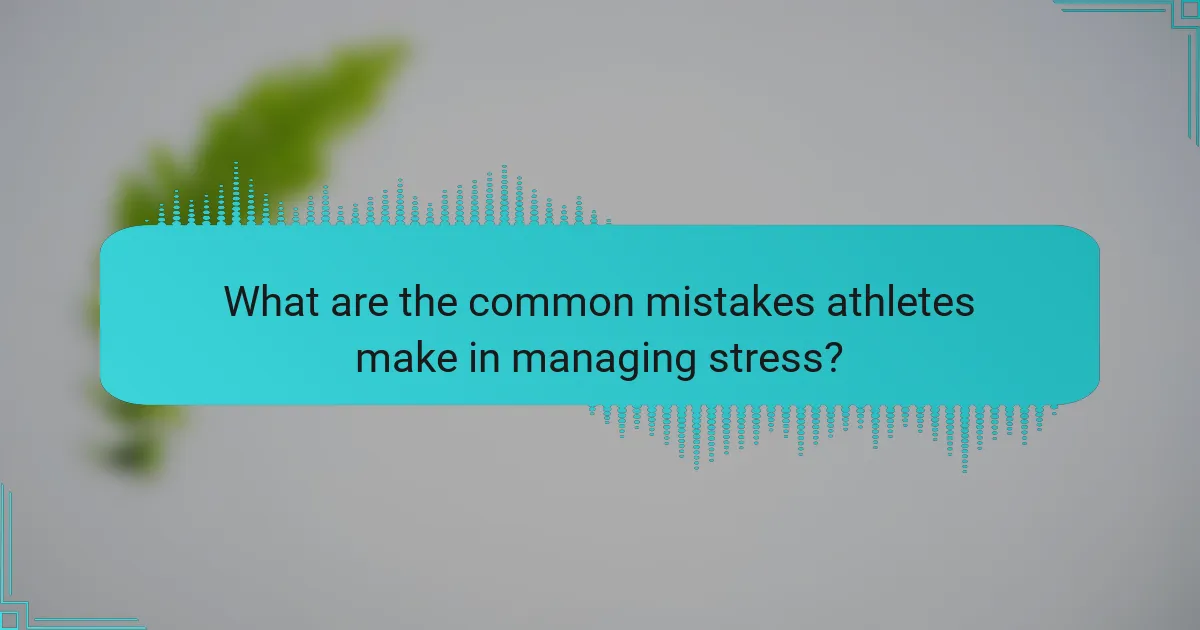
What are the common mistakes athletes make in managing stress?
Athletes often make critical mistakes in managing stress, impacting performance. Common errors include neglecting recovery, failing to set realistic goals, and avoiding open communication about stressors.
Neglecting recovery leads to burnout and decreased performance. Athletes should prioritize rest and relaxation techniques. Failing to set realistic goals can create unnecessary pressure, causing anxiety. Open communication with coaches and teammates about stressors fosters a supportive environment.
Additionally, athletes may overlook the importance of mental training, which is essential for resilience. Engaging in mindfulness practices can enhance focus and reduce anxiety. Lastly, ignoring nutrition’s role in stress management can exacerbate physical and mental fatigue.
How can athletes avoid overtraining and its psychological effects?
Athletes can avoid overtraining and its psychological effects by implementing structured recovery strategies. Prioritize rest days, engage in active recovery, and utilize stress management techniques such as mindfulness and relaxation exercises.
Monitoring training loads is crucial; athletes should aim for a balanced approach that includes both physical and mental health considerations. Regularly assessing fatigue levels through self-reflection can help identify early signs of overtraining.
Incorporating social support systems, such as coaches and fellow athletes, fosters a positive environment that mitigates stress. This unique attribute of community engagement enhances resilience against the psychological impacts of intense training.
Ultimately, athletes should cultivate an intuitive perspective on their bodies and minds, allowing them to respond to stressors effectively and maintain optimal performance.
What misconceptions about anxiety management should athletes be aware of?
Athletes often misunderstand anxiety management, believing it requires complete elimination of stress. In reality, stress can be a beneficial motivator. Another misconception is that seeking help indicates weakness; however, mental health support enhances performance. Many athletes think they must face anxiety alone, but sharing experiences with peers fosters resilience. Lastly, some believe relaxation techniques are ineffective, yet practices like mindfulness can significantly improve focus and reduce anxiety.
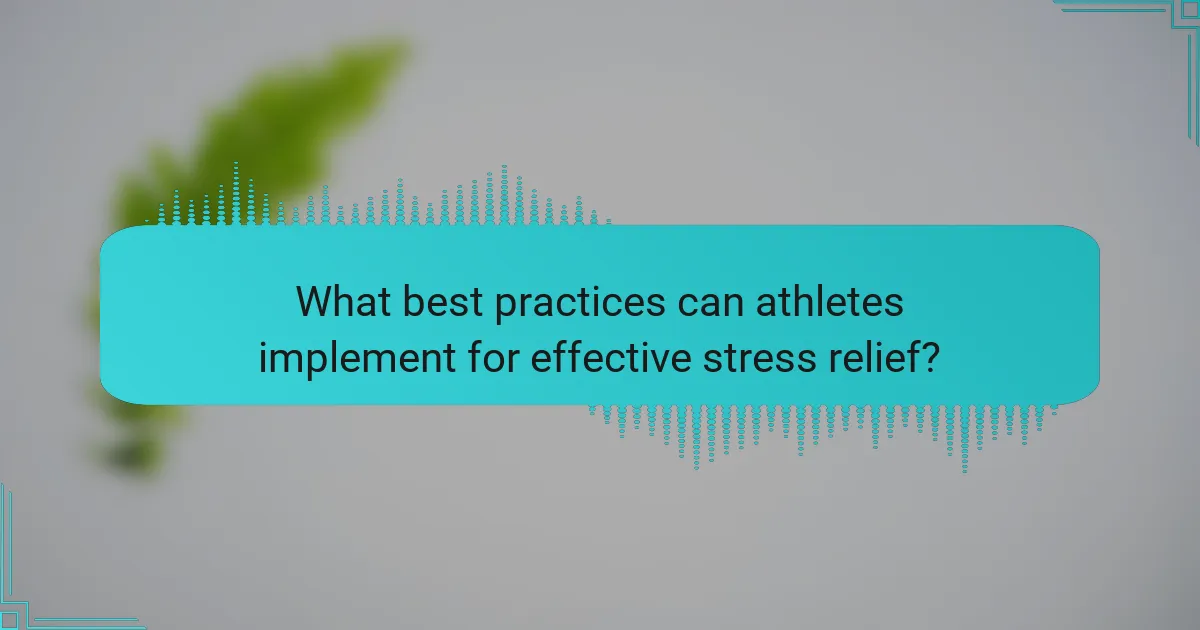
What best practices can athletes implement for effective stress relief?
Athletes can implement several best practices for effective stress relief. Techniques include mindfulness meditation, which enhances focus and reduces anxiety, and physical activity, which releases endorphins and improves mood. Breathing exercises can lower stress levels quickly, while maintaining a balanced diet supports overall mental health. Establishing a consistent sleep routine is vital for recovery and stress management. Seeking social support from teammates or coaches fosters a positive environment, enhancing resilience.
How can setting realistic goals improve mental resilience?
Setting realistic goals enhances mental resilience by providing achievable benchmarks that reduce stress and anxiety. Athletes benefit from clear objectives, fostering a sense of control and motivation. This approach encourages a positive mindset, allowing for better coping strategies during challenging situations. Research indicates that goal-setting can improve performance and mental well-being, making it a vital tool for athletes.
What role does social support play in managing athlete anxiety?
Social support significantly reduces athlete anxiety by providing emotional reassurance and practical assistance. Strong social networks enhance coping strategies, leading to improved performance. Research shows that athletes with supportive relationships experience lower stress levels and greater resilience. Engaging with coaches, teammates, and family fosters a sense of belonging, which is crucial for mental well-being.
What are the most effective self-care techniques for athletes?
Effective self-care techniques for athletes include mindfulness practices, regular physical activity, proper nutrition, and adequate sleep. These strategies enhance mental resilience and emotional well-being.
Mindfulness techniques, such as meditation and breathing exercises, help manage stress and anxiety. Research shows that athletes who practice mindfulness report lower levels of anxiety and improved focus during competitions.
Regular physical activity, beyond training, contributes to overall mental health. Engaging in enjoyable activities, like yoga or swimming, can reduce stress hormones and promote a positive mood.
Proper nutrition fuels the body and mind. A balanced diet rich in whole foods supports energy levels and cognitive function, which are crucial for peak performance.
Adequate sleep is vital for recovery and mental clarity. Athletes should aim for 7-9 hours of quality sleep per night to optimize performance and reduce stress.
How can athletes continuously evaluate and adapt their coping strategies?
Athletes can continuously evaluate and adapt their coping strategies by regularly reflecting on their performance and emotional responses. This involves tracking stress levels and identifying triggers.
Regular assessments allow athletes to recognize patterns in their coping mechanisms. For instance, journaling can reveal which strategies effectively reduce anxiety in specific situations.
Additionally, seeking feedback from coaches or sports psychologists provides external insights. This collaboration can highlight strengths and areas for improvement in coping strategies.
Finally, integrating mindfulness practices can enhance self-awareness, enabling athletes to adjust their approaches proactively. This adaptability fosters resilience and optimal performance under pressure.
